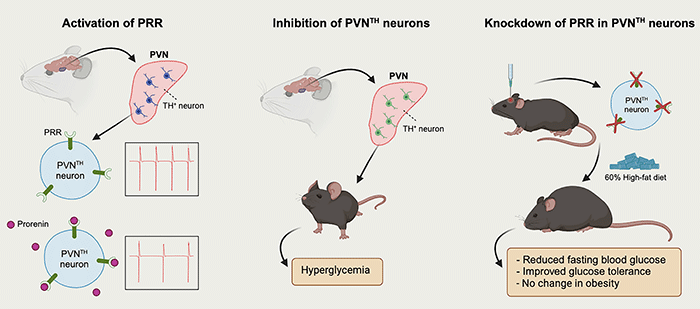Feng Earley Lab
Welcome to the Feng Earley Lab
Our research focuses on central mechanisms regulating blood pressure and metabolic function, with particular emphasis on the brain renin-angiotensin system (RAS), neural circuitry, neuroinflammation, and glial-neuronal interactions. A major discovery from my lab was identifying a novel pathway for brain angiotensin II formation via the (pro)renin receptor (PRR), resolving a long-standing question in our understanding of endogenous brain RAS activity and its role in neurogenic hypertension. We further demonstrated that hypothalamic PRR signaling, particularly in tyrosine hydroxylase–expressing neurons, drives sympathetic activation and metabolic dysfunction in high-fat diet models. My group integrates CNS-targeted gene manipulation, chemogenetics, telemetric blood pressure monitoring, and metabolic phenotyping to dissect these mechanisms.
I led the development of PRO20, a selective PRR antagonist with demonstrated efficacy in animal models of hypertension and metabolic disease. This work has resulted in multiple patents covering its potential use in hypertension, diabetic kidney disease, wound healing, and non-alcoholic fatty liver disease. Complementing this basic research, our translational studies revealed elevated cerebrospinal fluid sodium and increased brain PRR expression in individuals with hypertension, supporting the relevance of central sodium sensing in human hypertension. We also demonstrated that mobile health interventions can lower blood pressure in young adults at risk, underscoring the clinical potential of targeting central mechanisms and utilizing digital technologies in hypertension prevention and treatment.


Yumei Feng Earley, M.D., Ph.D.
Principal Investigator
Projects

Neural circuitry mechanisms of blood pressure regulation and hypertension

Neural mechanisms regulating blood glucose homeostasis
Publications
View All Publications- Central nervous system mechanisms of salt-sensitive hypertension.; Physiological reviews. 2025 May 02.
- Developing a predictive model for blood-brain-barrier permeability to explore relevance of in vitro neurotoxicity data for in vivo risk assessment.; Frontiers in toxicology; Vol 7, pp. 1535112. 2025 Apr 17.
- Mitochondrial Small RNA Alterations Associated with Increased Lysosome Activity in an Alzheimer's Disease Mouse Model Uncovered by PANDORA-seq.; International journal of molecular sciences; Vol 26(7). 2025 Mar 26.
- Update on Hypothalamic Inflammation and Gliosis: Expanding Evidence of Relevance Beyond Obesity.; Current obesity reports; Vol 14(1), pp. 6. 2025 Jan 08.
Contact Us
Feng-Earley Lab
601 Elmwood Ave, Box 604
Rochester, NY 14642


